联合国国家及其财产管辖豁免公约
- 格式:doc
- 大小:79.00 KB
- 文档页数:15
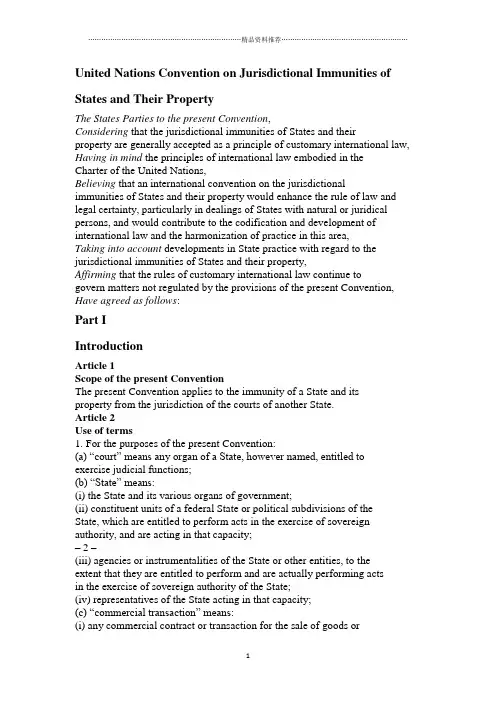
United Nations Convention on Jurisdictional Immunities of States and Their PropertyThe States Parties to the present Convention,Considering that the jurisdictional immunities of States and theirproperty are generally accepted as a principle of customary international law, Having in mind the principles of international law embodied in theCharter of the United Nations,Believing that an international convention on the jurisdictionalimmunities of States and their property would enhance the rule of law and legal certainty, particularly in dealings of States with natural or juridical persons, and would contribute to the codification and development of international law and the harmonization of practice in this area,Taking into account developments in State practice with regard to the jurisdictional immunities of States and their property,Affirming that the rules of customary international law continue togovern matters not regulated by the provisions of the present Convention, Have agreed as follows:Part IIntroductionArticle 1Scope of the present ConventionThe present Convention applies to the immunity of a State and itsproperty from the jurisdiction of the courts of another State.Article 2Use of terms1. For the purposes of the present Convention:(a) “court” means any organ of a State, however named, entitled to exercise judicial functions;(b) “State” means:(i) the State and its various organs of government;(ii) constituent units of a federal State or political subdivisions of the State, which are entitled to perform acts in the exercise of sovereign authority, and are acting in that capacity;– 2 –(iii) agencies or instrumentalities of the State or other entities, to theextent that they are entitled to perform and are actually performing actsin the exercise of sovereign authority of the State;(iv) representatives of the State acting in that capacity;(c) “commercial transaction” means:(i) any commercial contract or transaction for the sale of goods orsupply of services;(ii) any contract for a loan or other transaction of a financial nature, including any obligation of guarantee or of indemnity in respect of anysuch loan or transaction;(iii) any other contract or transaction of a commercial, industrial,trading or professional nature, but not including a contract ofemployment of persons.2. In determining whether a contract or transaction is a “commercial transaction” under paragraph 1 (c), reference should be made primarily to the nature of the contract or transaction, but its purpose should also be taken into account if the parties to the contract or transaction have so agreed, or if, in the practice of the State of the forum, that purpose is relevant to determining the non-commercial character of the contract or transaction.3. The provisions of paragraphs 1 and 2 regarding the use of terms in the present Convention are without prejudice to the use of those terms or to the meanings which may be given to them in other international instruments or in the internal law of any State.Article 3Privileges and immunities not affected by the present Convention1. The present Convention is without prejudice to the privileges and immunities enjoyed by a State under international law in relation to the exercise of the functions of:(a) its diplomatic missions, consular posts, special missions, missionsto international organizations or delegations to organs of international organizations or to international conferences; and(b) persons connected with them.2. The present Convention is without prejudice to privileges andimmunities accorded under international law to heads of State ratione personae.3. The present Convention is without prejudice to the immunities enjoyedby a State under international law with respect to aircraft or space objects owned or operated by a State.– 3 –Article 4Non-retroactivity of the present ConventionWithout prejudice to the application of any rules set forth in the present Convention to which jurisdictional immunities of States and their property are subject under international law independently of the present Convention, the present Convention shall not apply to any question of jurisdictional immunities of States or their property arising in a proceeding instituted against a State before a court of another State prior to the entry into force of the present Convention for the States concerned.Part IIGeneral principlesArticle 5State immunityA State enjoys immunity, in respect of itself and its property, from the jurisdiction of the courts of another State subject to the provisions of the present Convention.Article 6Modalities for giving effect to State immunity1. A State shall give effect to State immunity under article 5 by refraining from exercising jurisdiction in a proceeding before its courts against another State and to that end shall ensure that its courts determine on their own initiative that the immunity of that other State under article 5 is respected.2. A proceeding before a court of a State shall be considered to have been instituted against another State if that other State:(a) is named as a party to that proceeding; or(b) is not named as a party to the proceeding but the proceeding ineffect seeks to affect the property, rights, interests or activities of that other State.Article 7Express consent to exercise of jurisdiction1. A State cannot invoke immunity from jurisdiction in a proceeding beforea court of another State with regard to a matter or case if it has expressly consented to the exercise of jurisdiction by the court with regard to the matter or case:(a) by international agreement;(b) in a written contract; or– 4 –(c) by a declaration before the court or by a written communicationin a specific proceeding.2. Agreement by a State for the application of the law of another Stateshall not be interpreted as consent to the exercise of jurisdiction by the courts of that other State.Article 8Effect of participation in a proceeding before a court1. A State cannot invoke immunity from jurisdiction in a proceeding beforea court of another State if it has:(a) itself instituted the proceeding; or(b) intervened in the proceeding or taken any other step relating tothe merits. However, if the State satisfies the court that it could not have acquired knowledge of facts on which a claim to immunity can be based until after it took such a step, it can claim immunity based on those facts, provided it does so at the earliest possible moment.2. A State shall not be considered to have consented to the exercise ofjurisdiction by a court of another State if it intervenes in a proceeding or takes any other step for the sole purpose of:(a) invoking immunity; or(b) asserting a right or interest in property at issue in the proceeding.3. The appearance of a representative of a State before a court of another State as a witness shall not be interpreted as consent by the former State to the exercise of jurisdiction by the court.4. Failure on the part of a State to enter an appearance in a proceedingbefore a court of another State shall not be interpreted as consent by the former State to the exercise of jurisdiction by the court.Article 9Counterclaims1. A State instituting a proceeding before a court of another State cannot invoke immunity from the jurisdiction of the court in respect of any counterclaim arising out of the same legal relationship or facts as the principal claim.2. A State intervening to present a claim in a proceeding before a court of another State cannot invoke immunity from the jurisdiction of the court in respect of any counterclaim arising out of the same legal relationship or facts as the claim presented by the State.– 5 –3. A State making a counterclaim in a proceeding instituted against itbefore a court of another State cannot invoke immunity from the jurisdiction of the court in respect of the principal claim.Part IIIProceedings in which State immunity cannot be invokedArticle 10Commercial transactions1. If a State engages in a commercial transaction with a foreign natural or juridical person and, by virtue of the applicable rules of private international law, differences relating to the commercial transaction fall within the jurisdiction of a court of another State, the State cannot invoke immunity from that jurisdiction in a proceeding arising out of that commercial transaction.2. Paragraph 1 does not apply:(a) in the case of a commercial transaction between States; or(b) if the parties to the commercial transaction have expressly agreed otherwise.3. Where a State enterprise or other entity established by a State which hasan independent legal personality and is capable of:(a) suing or being sued; and(b) acquiring, owning or possessing and disposing of property,including property which that State has authorized it to operate or manage,is involved in a proceeding which relates to a commercial transaction in which that entity is engaged, the immunity from jurisdiction enjoyed by that State shall not be affected.Article 11Contracts of employment1. Unless otherwise agreed between the States concerned, a State cannot invoke immunity from jurisdiction before a court of another State which is otherwise competent in a proceeding which relates to a contract of employment between the State and an individual for work performed or to be performed, in whole or in part, in the territory of that other State.2. Paragraph 1 does not apply if:(a) the employee has been recruited to perform particular functions inthe exercise of governmental authority;(b) the employee is:– 6 –(i) a diplomatic agent, as defined in the Vienna Convention onDiplomatic Relations of 1961;(ii) a consular officer, as defined in the Vienna Convention onConsular Relations of 1963;(iii) a member of the diplomatic staff of a permanent mission to an international organization or of a special mission, or is recruited to represent a State at an international conference; or(iv) any other person enjoying diplomatic immunity;(c) the subject-matter of the proceeding is the recruitment, renewal of employment or reinstatement of an individual;(d) the subject-matter of the proceeding is the dismissal ortermination of employment of an individual and, as determined by the head of State, the head of Government or the Minister for Foreign Affairs of the employer State, such a proceeding would interfere with the security interests of that State;(e) the employee is a national of the employer State at the time whenthe proceeding is instituted, unless this person has the permanent residence in the State of the forum; or(f) the employer State and the employee have otherwise agreed inwriting, subject to any considerations of public policy conferring on the courts of the State of the forum exclusive jurisdiction by reason of the subject-matter of the proceeding.Article 12Personal injuries and damage to propertyUnless otherwise agreed between the States concerned, a State cannotinvoke immunity from jurisdiction before a court of another State which is otherwise competent in a proceeding which relates to pecuniary compensation for death or injury to the person, or damage to or loss of tangible property, caused by an act or omission which is alleged to be attributable to the State, ifthe act or omission occurred in whole or in part in the territory of that other State and if the author of the act or omission was present in that territory at the time of the act or omission.Article 13Ownership, possession and use of propertyUnless otherwise agreed between the States concerned, a State cannotinvoke immunity from jurisdiction before a court of another State which is otherwise competent in a proceeding which relates to the determination of:– 7 –(a) any right or interest of the State in, or its possession or use of, orany obligation of the State arising out of its interest in, or its possession or use of, immovable property situated in the State of the forum;(b) any right or interest of the State in movable or immovableproperty arising by way of succession, gift or bona vacantia; or(c) any right or interest of the State in the administration of property,such as trust property, the estate of a bankrupt or the property of a company in the event of its winding up.Article 14Intellectual and industrial propertyUnless otherwise agreed between the States concerned, a State cannotinvoke immunity from jurisdiction before a court of another State which is otherwise competent in a proceeding which relates to:(a) the determination of any right of the State in a patent, industrialdesign, trade name or business name, trademark, copyright or any other form of intellectual or industrial property which enjoys a measure of legal protection, even if provisional, in the State of the forum; or(b) an alleged infringement by the State, in the territory of the Stateof the forum, of a right of the nature mentioned in subparagraph (a) which belongs to a third person and is protected in the State of the forum.Article 15Participation in companies or other collective bodies1. A State cannot invoke immunity from jurisdiction before a court of another State which is otherwise competent in a proceeding which relates to its participation in a company or other collective body, whether incorporated or unincorporated, being a proceeding concerning the relationship between the State and the body or the other participants therein, provided that the body: (a) has participants other than States or international organizations;and(b) is incorporated or constituted under the law of the State of theforum or has its seat or principal place of business in that State.2. A State can, however, invoke immunity from jurisdiction in such a proceeding if the States concerned have so agreed or if the parties to the dispute have so provided by an agreement in writing or if the instrument establishing or regulating the body in question contains provisions to thateffect.– 8 –Article 16Ships owned or operated by a State1. Unless otherwise agreed between the States concerned, a State whichowns or operates a ship cannot invoke immunity from jurisdiction before a court of another State which is otherwise competent in a proceeding which relates to the operation of that ship if, at the time the cause of action arose, the ship was used for other than government non-commercial purposes.2. Paragraph 1 does not apply to warships, or naval auxiliaries, nor does it apply to other vessels owned or operated by a State and used, for the time being, only on government non-commercial service.3. Unless otherwise agreed between the States concerned, a State cannot invoke immunity from jurisdiction before a court of another State which is otherwise competent in a proceeding which relates to the carriage of cargo on board a ship owned or operated by that State if, at the time the cause of action arose, the ship was used for other than government non-commercial purposes.4. Paragraph 3 does not apply to any cargo carried on board the ships referred to in paragraph 2, nor does it apply to any cargo owned by a State and used or intended for use exclusively for government non-commercial purposes.5. States may plead all measures of defence, prescription and limitation of liability which are available to private ships and cargoes and their owners.6. If in a proceeding there arises a question relating to the government and non-commercial character of a ship owned or operated by a State or cargo owned by a State, a certificate signed by a diplomatic representative or other competent authority of that State and communicated to the court shall serve as evidence of the character of that ship or cargo.Article 17Effect of an arbitration agreementIf a State enters into an agreement in writing with a foreign natural or juridical person to submit to arbitration differences relating to a commercial transaction, that State cannot invoke immunity from jurisdiction before a court of another State which is otherwise competent in a proceeding which relates to:(a) the validity, interpretation or application of the arbitrationagreement;(b) the arbitration procedure; or(c) the confirmation or the setting aside of the award,unless the arbitration agreement otherwise provides.– 9 –Part IVState immunity from measures of constraint in connection withproceedings before a courtArticle 18State immunity from pre-judgment measures of constraintNo pre-judgment measures of constraint, such as attachment or arrest, against property of a State may be taken in connection with a proceeding before a court of another State unless and except to the extent that:(a) the State has expressly consented to the taking of such measuresas indicated:(i) by international agreement;(ii) by an arbitration agreement or in a written contract; or(iii) by a declaration before the court or by a written communicationafter a dispute between the parties has arisen; or(b) the State has allocated or earmarked property for the satisfactionof the claim which is the object of that proceeding.Article 19State immunity from post-judgment measures of constraintNo post-judgment measures of constraint, such as attachment, arrest or execution, against property of a State may be taken in connection with a proceeding before a court of another State unless and except to the extent that: (a) the State has expressly consented to the taking of such measuresas indicated:(i) by international agreement;(ii) by an arbitration agreement or in a written contract; or(iii) by a declaration before the court or by a written communicationafter a dispute between the parties has arisen; or(b) the State has allocated or earmarked property for the satisfactionof the claim which is the object of that proceeding; or(c) it has been established that the property is specifically in use orintended for use by the State for other than government non-commercial purposes and is in the territory of the State of the forum, provided that postjudgmentmeasures of constraint may only be taken against property that has a connection with the entity against which the proceeding was directed.– 10 –Article 20Effect of consent to jurisdiction to measures of constraintWhere consent to the measures of constraint is required under articles 18and 19, consent to the exercise of jurisdiction under article 7 shall not imply consent to the taking of measures of constraint.Article 21Specific categories of property1. The following categories, in particular, of property of a State shall notbe considered as property specifically in use or intended for use by the Statefor other than government non-commercial purposes under article 19, subparagraph (c):(a) property, including any bank account, which is used or intendedfor use in the performance of the functions of the diplomatic mission of the State or its consular posts, special missions, missions to international organizations or delegations to organs of international organizations or to international conferences;(b) property of a military character or used or intended for use in the performance of military functions;(c) property of the central bank or other monetary authority of theState;(d) property forming part of the cultural heritage of the State or partof its archives and not placed or intended to be placed on sale;(e) property forming part of an exhibition of objects of scientific,cultural or historical interest and not placed or intended to be placed on sale.2. Paragraph 1 is without prejudice to article 18 and article 19, subparagraphs (a) and (b).Part VMiscellaneous provisionsArticle 22Service of process1. Service of process by writ or other document instituting a proceeding against a State shall be effected:(a) in accordance with any applicable international conventionbinding on the State of the forum and the State concerned; or– 11 –(b) in accordance with any special arrangement for service betweenthe claimant and the State concerned, if not precluded by the law of the State of the forum; or(c) in the absence of such a convention or special arrangement:(i) by transmission through diplomatic channels to the Ministry ofForeign Affairs of the State concerned; or(ii) by any other means accepted by the State concerned, if notprecluded by the law of the State of the forum.2. Service of process referred to in paragraph 1 (c) (i) is deemed to have been effected by receipt of the documents by the Ministry of Foreign Affairs.3. These documents shall be accompanied, if necessary, by a translationinto the official language, or one of the official languages, of the State concerned.4. Any State that enters an appearance on the merits in a proceeding instituted against it may not thereafter assert that service of process did not comply with the provisions of paragraphs 1 and 3.Article 23Default judgment1. A default judgment shall not be rendered against a State unless the court has found that:(a) the requirements laid down in article 22, paragraphs 1 and 3, havebeen complied with;(b) a period of not less than four months has expired from the date onwhich the service of the writ or other document instituting a proceeding has been effected or deemed to have been effected in accordance with article 22, paragraphs 1 and 2; and(c) the present Convention does not preclude it from exercising jurisdiction.2. A copy of any default judgment rendered against a State, accompanied if necessary by a translation into the official language or one of the official languages of the State concerned, shall be transmitted to it through one of the means specified in article 22, paragraph 1, and in accordance with the provisions of that paragraph.3. The time-limit for applying to have a default judgment set aside shallnot be less than four months and shall begin to run from the date on which the copy of the judgment is received or is deemed to have been received by the State concerned.– 12 –Article 24Privileges and immunities during court proceedings1. Any failure or refusal by a State to comply with an order of a court of another State enjoining it to perform or refrain from performing a specific act or to produce any document or disclose any other information for the purposes of a proceeding shall entail no consequences other than those which may result from such conduct in relation to the merits of the case. In particular, no fine or penalty shall be imposed on the State by reason of such failure or refusal.2. A State shall not be required to provide any security, bond or deposit, however described, to guarantee the payment of judicial costs or expenses in any proceeding to which it is a respondent party before a court of another State.Part VIFinal clausesArticle 25AnnexThe annex to the present Convention forms an integral part of the Convention.Article 26Other international agreementsNothing in the present Convention shall affect the rights and obligationsof States Parties under existing international agreements which relate to matters dealt with in the present Convention as between the parties to those agreements.Article 27Settlement of disputes1. States Parties shall endeavour to settle disputes concerning the interpretation or application of the present Convention through negotiation.2. Any dispute between two or more States Parties concerning the interpretation or application of the present Convention which cannot be settled through negotiation within six months shall, at the request of any of those States Parties, be submitted to arbitration. If, six months after the date of the request for arbitration, those States Parties are unable to agree on the organization of the arbitration, any of those States Parties may refer the dispute to the International Court of Justice by request in accordance with the Statute of the Court.– 13 –3. Each State Party may, at the time of signature, ratification, acceptance or approval of, or accession to, the present Convention, declare that it does not consider itself bound by paragraph 2. The other States Parties shall not be bound by paragraph 2 with respect to any State Party which has made such a declaration.4. Any State Party that has made a declaration in accordance with paragraph 3 may at any time withdraw that declaration by notification to the Secretary-General of the United Nations.Article 28SignatureThe present Convention shall be open for signature by all States until17 January 2007, at United Nations Headquarters, New York.Article 29Ratification, acceptance, approval or accession1. The present Convention shall be subject to ratification, acceptance or approval.2. The present Convention shall remain open for accession by any State.3. The instruments of ratification, acceptance, approval or accession shallbe deposited with the Secretary-General of the United Nations.Article 30Entry into force1. The present Convention shall enter into force on the thirtieth dayfollowing the date of deposit of the thirtieth instrument of ratification, acceptance, approval or accession with the Secretary-General of the United Nations.2. For each State ratifying, accepting, approving or acceding to the present Convention after the deposit of the thirtieth instrument of ratification,acceptance, approval or accession, the Convention shall enter into force on the thirtieth day after the deposit by such State of its instrument of ratification, acceptance, approval or accession.Article 31Denunciation1. Any State Party may denounce the present Convention by written notification to the Secretary-General of the United Nations.2. Denunciation shall take effect one year following the date on which notification is received by the Secretary-General of the United Nations. The present Convention shall, however, continue to apply to any question of– 14 –jurisdictional immunities of States or their property arising in a proceeding instituted against a State before a court of another State prior to the date on which the denunciation takes effect for any of the States concerned.3. The denunciation shall not in any way affect the duty of any State Partyto fulfil any obligation embodied in the present Convention to which it would be subject under international law independently of the present Convention. Article 32Depositary and notifications1. The Secretary-General of the United Nations is designated thedepositary of the present Convention.2. As depositary of the present Convention, the Secretary-General of the United Nations shall inform all States of the following:(a) signatures of the present Convention and the deposit ofinstruments of ratification, acceptance, approval or accession or notifications of denunciation, in accordance with articles 29 and 31;(b) the date on which the present Convention will enter into force, in accordance with article 30;(c) any acts, notifications or communications relating to the present Convention.Article 33Authentic textsThe Arabic, Chinese, English, French, Russian and Spanish texts of the present Convention are equally authentic.IN WITNESS WHEREOF, the undersigned, being duly authorizedthereto by their respective Governments, have signed this Convention opened for signature at United Nations Headquarters in New York on 17 January 2005. – 15 –Annex to the ConventionUnderstandings with respect to certain provisions of the Convention。
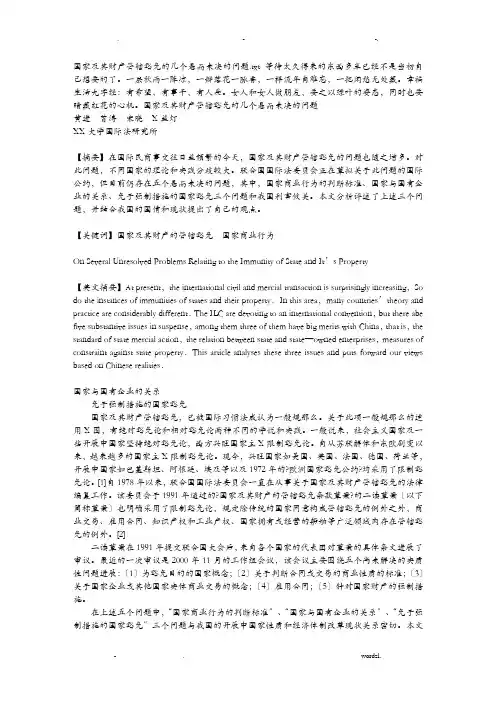
国家及其财产管辖豁免的几个悬而未决的问题.txt等待太久得来的东西多半已经不是当初自己想要的了。
一层秋雨一阵凉,一瓣落花一脉香,一样流年自难忘,一把闲愁无处藏。
幸福生活九字经:有希望,有事干,有人爱。
女人和女人做朋友,要之以绿叶的姿态,同时也要暗藏红花的心机。
国家及其财产管辖豁免的几个悬而未决的问题黄进曾涛宋晓X益灯XX大学国际法研究所【摘要】在国际民商事交往日益频繁的今天,国家及其财产管辖豁免的问题也随之增多。
对此问题,不同国家的理论和实践分歧较大。
联合国国际法委员会正在草拟关于此问题的国际公约,但目前仍存在五个悬而未决的问题,其中,国家商业行为的判断标准、国家与国有企业的关系、免于强制措施的国家豁免三个问题和我国利害攸关。
本文分析评述了上述三个问题,并结合我国的国情和现状提出了自己的观点。
【关键词】国家及其财产的管辖豁免国家商业行为On Several Unresolved Problems Relating to the Immunity of State and It’s Property【英文摘要】At present,the international civil and mercial transaction is surprisingly increasing,So do the instances of immunities of states and their property.In this area,many countries’theory and practice are considerably different.The ILC are devoting to an international convention,but there abe five substantive issues in suspense,among them three of them have big merits with China,that is,the standard of state mercial action,the relation between state and state—owned enterprises,measures of constraint against state property.This article analyses these three issues and puts forward our views based on Chinese realities.国家与国有企业的关系免于强制措施的国家豁免国家及其财产管辖豁免,已被国际习惯法成认为一般规那么。
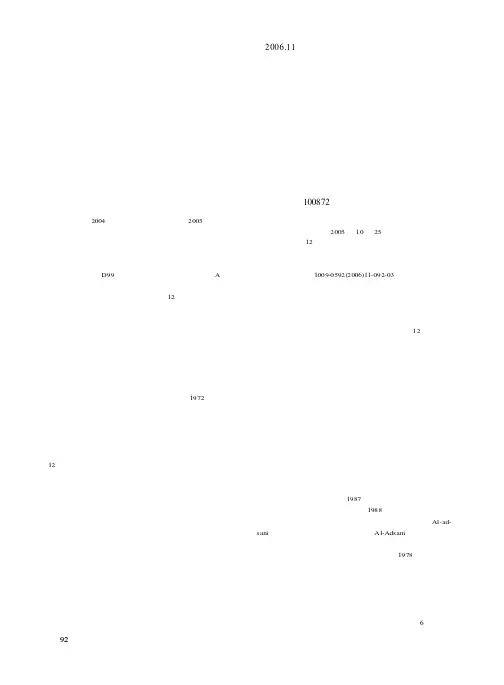
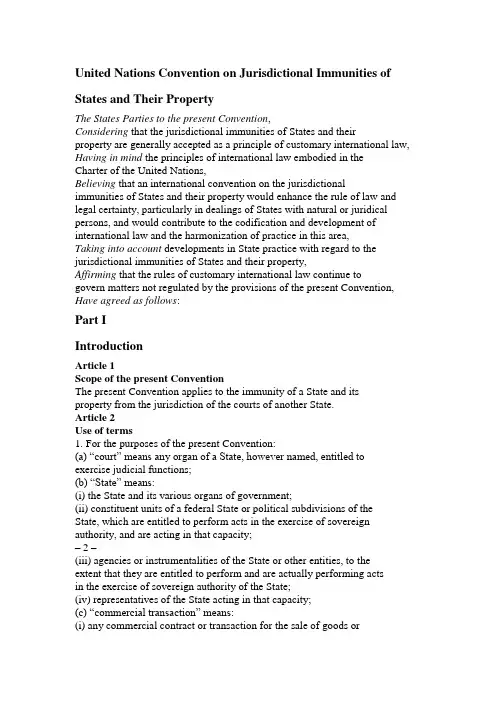
United Nations Convention on Jurisdictional Immunities of States and Their PropertyThe States Parties to the present Convention,Considering that the jurisdictional immunities of States and theirproperty are generally accepted as a principle of customary international law, Having in mind the principles of international law embodied in theCharter of the United Nations,Believing that an international convention on the jurisdictionalimmunities of States and their property would enhance the rule of law and legal certainty, particularly in dealings of States with natural or juridical persons, and would contribute to the codification and development of international law and the harmonization of practice in this area,Taking into account developments in State practice with regard to the jurisdictional immunities of States and their property,Affirming that the rules of customary international law continue togovern matters not regulated by the provisions of the present Convention, Have agreed as follows:Part IIntroductionArticle 1Scope of the present ConventionThe present Convention applies to the immunity of a State and itsproperty from the jurisdiction of the courts of another State.Article 2Use of terms1. For the purposes of the present Convention:(a) “court” means any organ of a State, however named, entitled to exercise judicial functions;(b) “State” means:(i) the State and its various organs of government;(ii) constituent units of a federal State or political subdivisions of the State, which are entitled to perform acts in the exercise of sovereign authority, and are acting in that capacity;– 2 –(iii) agencies or instrumentalities of the State or other entities, to theextent that they are entitled to perform and are actually performing actsin the exercise of sovereign authority of the State;(iv) representatives of the State acting in that capacity;(c) “commercial transaction” means:(i) any commercial contract or transaction for the sale of goods orsupply of services;(ii) any contract for a loan or other transaction of a financial nature, including any obligation of guarantee or of indemnity in respect of anysuch loan or transaction;(iii) any other contract or transaction of a commercial, industrial,trading or professional nature, but not including a contract ofemployment of persons.2. In determining whether a contract or transaction is a “commercial transaction” under paragraph 1 (c), reference should be made primarily to the nature of the contract or transaction, but its purpose should also be taken into account if the parties to the contract or transaction have so agreed, or if, in the practice of the State of the forum, that purpose is relevant to determining the non-commercial character of the contract or transaction.3. The provisions of paragraphs 1 and 2 regarding the use of terms in the present Convention are without prejudice to the use of those terms or to the meanings which may be given to them in other international instruments or in the internal law of any State.Article 3Privileges and immunities not affected by the present Convention1. The present Convention is without prejudice to the privileges and immunities enjoyed by a State under international law in relation to the exercise of the functions of:(a) its diplomatic missions, consular posts, special missions, missionsto international organizations or delegations to organs of international organizations or to international conferences; and(b) persons connected with them.2. The present Convention is without prejudice to privileges andimmunities accorded under international law to heads of State ratione personae.3. The present Convention is without prejudice to the immunities enjoyedby a State under international law with respect to aircraft or space objects owned or operated by a State.– 3 –Article 4Non-retroactivity of the present ConventionWithout prejudice to the application of any rules set forth in the present Convention to which jurisdictional immunities of States and their property are subject under international law independently of the present Convention, the present Convention shall not apply to any question of jurisdictional immunities of States or their property arising in a proceeding instituted against a State before a court of another State prior to the entry into force of the present Convention for the States concerned.Part IIGeneral principlesArticle 5State immunityA State enjoys immunity, in respect of itself and its property, from the jurisdiction of the courts of another State subject to the provisions of the present Convention.Article 6Modalities for giving effect to State immunity1. A State shall give effect to State immunity under article 5 by refraining from exercising jurisdiction in a proceeding before its courts against another State and to that end shall ensure that its courts determine on their own initiative that the immunity of that other State under article 5 is respected.2. A proceeding before a court of a State shall be considered to have been instituted against another State if that other State:(a) is named as a party to that proceeding; or(b) is not named as a party to the proceeding but the proceeding ineffect seeks to affect the property, rights, interests or activities of that other State.Article 7Express consent to exercise of jurisdiction1. A State cannot invoke immunity from jurisdiction in a proceeding beforea court of another State with regard to a matter or case if it has expressly consented to the exercise of jurisdiction by the court with regard to the matter or case:(a) by international agreement;(b) in a written contract; or– 4 –(c) by a declaration before the court or by a written communicationin a specific proceeding.2. Agreement by a State for the application of the law of another Stateshall not be interpreted as consent to the exercise of jurisdiction by the courts of that other State.Article 8Effect of participation in a proceeding before a court1. A State cannot invoke immunity from jurisdiction in a proceeding beforea court of another State if it has:(a) itself instituted the proceeding; or(b) intervened in the proceeding or taken any other step relating tothe merits. However, if the State satisfies the court that it could not have acquired knowledge of facts on which a claim to immunity can be based until after it took such a step, it can claim immunity based on those facts, provided it does so at the earliest possible moment.2. A State shall not be considered to have consented to the exercise ofjurisdiction by a court of another State if it intervenes in a proceeding or takes any other step for the sole purpose of:(a) invoking immunity; or(b) asserting a right or interest in property at issue in the proceeding.3. The appearance of a representative of a State before a court of another State as a witness shall not be interpreted as consent by the former State to the exercise of jurisdiction by the court.4. Failure on the part of a State to enter an appearance in a proceedingbefore a court of another State shall not be interpreted as consent by the former State to the exercise of jurisdiction by the court.Article 9Counterclaims1. A State instituting a proceeding before a court of another State cannot invoke immunity from the jurisdiction of the court in respect of any counterclaim arising out of the same legal relationship or facts as the principal claim.2. A State intervening to present a claim in a proceeding before a court of another State cannot invoke immunity from the jurisdiction of the court in respect of any counterclaim arising out of the same legal relationship or facts as the claim presented by the State.– 5 –3. A State making a counterclaim in a proceeding instituted against itbefore a court of another State cannot invoke immunity from the jurisdiction of the court in respect of the principal claim.Part IIIProceedings in which State immunity cannot be invokedArticle 10Commercial transactions1. If a State engages in a commercial transaction with a foreign natural or juridical person and, by virtue of the applicable rules of private international law, differences relating to the commercial transaction fall within the jurisdiction of a court of another State, the State cannot invoke immunity from that jurisdiction in a proceeding arising out of that commercial transaction.2. Paragraph 1 does not apply:(a) in the case of a commercial transaction between States; or(b) if the parties to the commercial transaction have expressly agreed otherwise.3. Where a State enterprise or other entity established by a State which hasan independent legal personality and is capable of:(a) suing or being sued; and(b) acquiring, owning or possessing and disposing of property,including property which that State has authorized it to operate or manage,is involved in a proceeding which relates to a commercial transaction in which that entity is engaged, the immunity from jurisdiction enjoyed by that State shall not be affected.Article 11Contracts of employment1. Unless otherwise agreed between the States concerned, a State cannot invoke immunity from jurisdiction before a court of another State which is otherwise competent in a proceeding which relates to a contract of employment between the State and an individual for work performed or to be performed, in whole or in part, in the territory of that other State.2. Paragraph 1 does not apply if:(a) the employee has been recruited to perform particular functions inthe exercise of governmental authority;(b) the employee is:– 6 –(i) a diplomatic agent, as defined in the Vienna Convention onDiplomatic Relations of 1961;(ii) a consular officer, as defined in the Vienna Convention onConsular Relations of 1963;(iii) a member of the diplomatic staff of a permanent mission to an international organization or of a special mission, or is recruited to represent a State at an international conference; or(iv) any other person enjoying diplomatic immunity;(c) the subject-matter of the proceeding is the recruitment, renewal of employment or reinstatement of an individual;(d) the subject-matter of the proceeding is the dismissal ortermination of employment of an individual and, as determined by the head of State, the head of Government or the Minister for Foreign Affairs of the employer State, such a proceeding would interfere with the security interests of that State;(e) the employee is a national of the employer State at the time whenthe proceeding is instituted, unless this person has the permanent residence in the State of the forum; or(f) the employer State and the employee have otherwise agreed inwriting, subject to any considerations of public policy conferring on the courts of the State of the forum exclusive jurisdiction by reason of the subject-matter of the proceeding.Article 12Personal injuries and damage to propertyUnless otherwise agreed between the States concerned, a State cannotinvoke immunity from jurisdiction before a court of another State which is otherwise competent in a proceeding which relates to pecuniary compensation for death or injury to the person, or damage to or loss of tangible property, caused by an act or omission which is alleged to be attributable to the State, ifthe act or omission occurred in whole or in part in the territory of that other State and if the author of the act or omission was present in that territory at the time of the act or omission.Article 13Ownership, possession and use of propertyUnless otherwise agreed between the States concerned, a State cannotinvoke immunity from jurisdiction before a court of another State which is otherwise competent in a proceeding which relates to the determination of:– 7 –(a) any right or interest of the State in, or its possession or use of, orany obligation of the State arising out of its interest in, or its possession or use of, immovable property situated in the State of the forum;(b) any right or interest of the State in movable or immovableproperty arising by way of succession, gift or bona vacantia; or(c) any right or interest of the State in the administration of property,such as trust property, the estate of a bankrupt or the property of a company in the event of its winding up.Article 14Intellectual and industrial propertyUnless otherwise agreed between the States concerned, a State cannotinvoke immunity from jurisdiction before a court of another State which is otherwise competent in a proceeding which relates to:(a) the determination of any right of the State in a patent, industrialdesign, trade name or business name, trademark, copyright or any other form of intellectual or industrial property which enjoys a measure of legal protection, even if provisional, in the State of the forum; or(b) an alleged infringement by the State, in the territory of the Stateof the forum, of a right of the nature mentioned in subparagraph (a) which belongs to a third person and is protected in the State of the forum.Article 15Participation in companies or other collective bodies1. A State cannot invoke immunity from jurisdiction before a court of another State which is otherwise competent in a proceeding which relates to its participation in a company or other collective body, whether incorporated or unincorporated, being a proceeding concerning the relationship between the State and the body or the other participants therein, provided that the body: (a) has participants other than States or international organizations;and(b) is incorporated or constituted under the law of the State of theforum or has its seat or principal place of business in that State.2. A State can, however, invoke immunity from jurisdiction in such a proceeding if the States concerned have so agreed or if the parties to the dispute have so provided by an agreement in writing or if the instrument establishing or regulating the body in question contains provisions to thateffect.– 8 –Article 16Ships owned or operated by a State1. Unless otherwise agreed between the States concerned, a State whichowns or operates a ship cannot invoke immunity from jurisdiction before a court of another State which is otherwise competent in a proceeding which relates to the operation of that ship if, at the time the cause of action arose, the ship was used for other than government non-commercial purposes.2. Paragraph 1 does not apply to warships, or naval auxiliaries, nor does it apply to other vessels owned or operated by a State and used, for the time being, only on government non-commercial service.3. Unless otherwise agreed between the States concerned, a State cannot invoke immunity from jurisdiction before a court of another State which is otherwise competent in a proceeding which relates to the carriage of cargo on board a ship owned or operated by that State if, at the time the cause of action arose, the ship was used for other than government non-commercial purposes.4. Paragraph 3 does not apply to any cargo carried on board the ships referred to in paragraph 2, nor does it apply to any cargo owned by a State and used or intended for use exclusively for government non-commercial purposes.5. States may plead all measures of defence, prescription and limitation of liability which are available to private ships and cargoes and their owners.6. If in a proceeding there arises a question relating to the government and non-commercial character of a ship owned or operated by a State or cargo owned by a State, a certificate signed by a diplomatic representative or other competent authority of that State and communicated to the court shall serve as evidence of the character of that ship or cargo.Article 17Effect of an arbitration agreementIf a State enters into an agreement in writing with a foreign natural or juridical person to submit to arbitration differences relating to a commercial transaction, that State cannot invoke immunity from jurisdiction before a court of another State which is otherwise competent in a proceeding which relates to:(a) the validity, interpretation or application of the arbitrationagreement;(b) the arbitration procedure; or(c) the confirmation or the setting aside of the award,unless the arbitration agreement otherwise provides.– 9 –Part IVState immunity from measures of constraint in connection withproceedings before a courtArticle 18State immunity from pre-judgment measures of constraintNo pre-judgment measures of constraint, such as attachment or arrest, against property of a State may be taken in connection with a proceeding before a court of another State unless and except to the extent that:(a) the State has expressly consented to the taking of such measuresas indicated:(i) by international agreement;(ii) by an arbitration agreement or in a written contract; or(iii) by a declaration before the court or by a written communicationafter a dispute between the parties has arisen; or(b) the State has allocated or earmarked property for the satisfactionof the claim which is the object of that proceeding.Article 19State immunity from post-judgment measures of constraintNo post-judgment measures of constraint, such as attachment, arrest or execution, against property of a State may be taken in connection with a proceeding before a court of another State unless and except to the extent that: (a) the State has expressly consented to the taking of such measuresas indicated:(i) by international agreement;(ii) by an arbitration agreement or in a written contract; or(iii) by a declaration before the court or by a written communicationafter a dispute between the parties has arisen; or(b) the State has allocated or earmarked property for the satisfactionof the claim which is the object of that proceeding; or(c) it has been established that the property is specifically in use orintended for use by the State for other than government non-commercial purposes and is in the territory of the State of the forum, provided that postjudgmentmeasures of constraint may only be taken against property that has a connection with the entity against which the proceeding was directed.– 10 –Article 20Effect of consent to jurisdiction to measures of constraintWhere consent to the measures of constraint is required under articles 18and 19, consent to the exercise of jurisdiction under article 7 shall not imply consent to the taking of measures of constraint.Article 21Specific categories of property1. The following categories, in particular, of property of a State shall notbe considered as property specifically in use or intended for use by the Statefor other than government non-commercial purposes under article 19, subparagraph (c):(a) property, including any bank account, which is used or intendedfor use in the performance of the functions of the diplomatic mission of the State or its consular posts, special missions, missions to international organizations or delegations to organs of international organizations or to international conferences;(b) property of a military character or used or intended for use in the performance of military functions;(c) property of the central bank or other monetary authority of theState;(d) property forming part of the cultural heritage of the State or partof its archives and not placed or intended to be placed on sale;(e) property forming part of an exhibition of objects of scientific,cultural or historical interest and not placed or intended to be placed on sale.2. Paragraph 1 is without prejudice to article 18 and article 19, subparagraphs (a) and (b).Part VMiscellaneous provisionsArticle 22Service of process1. Service of process by writ or other document instituting a proceeding against a State shall be effected:(a) in accordance with any applicable international conventionbinding on the State of the forum and the State concerned; or– 11 –(b) in accordance with any special arrangement for service betweenthe claimant and the State concerned, if not precluded by the law of the State of the forum; or(c) in the absence of such a convention or special arrangement:(i) by transmission through diplomatic channels to the Ministry ofForeign Affairs of the State concerned; or(ii) by any other means accepted by the State concerned, if notprecluded by the law of the State of the forum.2. Service of process referred to in paragraph 1 (c) (i) is deemed to have been effected by receipt of the documents by the Ministry of Foreign Affairs.3. These documents shall be accompanied, if necessary, by a translationinto the official language, or one of the official languages, of the State concerned.4. Any State that enters an appearance on the merits in a proceeding instituted against it may not thereafter assert that service of process did not comply with the provisions of paragraphs 1 and 3.Article 23Default judgment1. A default judgment shall not be rendered against a State unless the court has found that:(a) the requirements laid down in article 22, paragraphs 1 and 3, havebeen complied with;(b) a period of not less than four months has expired from the date onwhich the service of the writ or other document instituting a proceeding has been effected or deemed to have been effected in accordance with article 22, paragraphs 1 and 2; and(c) the present Convention does not preclude it from exercising jurisdiction.2. A copy of any default judgment rendered against a State, accompanied if necessary by a translation into the official language or one of the official languages of the State concerned, shall be transmitted to it through one of the means specified in article 22, paragraph 1, and in accordance with the provisions of that paragraph.3. The time-limit for applying to have a default judgment set aside shallnot be less than four months and shall begin to run from the date on which the copy of the judgment is received or is deemed to have been received by the State concerned.– 12 –Article 24Privileges and immunities during court proceedings1. Any failure or refusal by a State to comply with an order of a court of another State enjoining it to perform or refrain from performing a specific act or to produce any document or disclose any other information for the purposes of a proceeding shall entail no consequences other than those which may result from such conduct in relation to the merits of the case. In particular, no fine or penalty shall be imposed on the State by reason of such failure or refusal.2. A State shall not be required to provide any security, bond or deposit, however described, to guarantee the payment of judicial costs or expenses in any proceeding to which it is a respondent party before a court of another State.Part VIFinal clausesArticle 25AnnexThe annex to the present Convention forms an integral part of the Convention.Article 26Other international agreementsNothing in the present Convention shall affect the rights and obligationsof States Parties under existing international agreements which relate to matters dealt with in the present Convention as between the parties to those agreements.Article 27Settlement of disputes1. States Parties shall endeavour to settle disputes concerning the interpretation or application of the present Convention through negotiation.2. Any dispute between two or more States Parties concerning the interpretation or application of the present Convention which cannot be settled through negotiation within six months shall, at the request of any of those States Parties, be submitted to arbitration. If, six months after the date of the request for arbitration, those States Parties are unable to agree on the organization of the arbitration, any of those States Parties may refer the dispute to the International Court of Justice by request in accordance with the Statute of the Court.– 13 –3. Each State Party may, at the time of signature, ratification, acceptance or approval of, or accession to, the present Convention, declare that it does not consider itself bound by paragraph 2. The other States Parties shall not be bound by paragraph 2 with respect to any State Party which has made such a declaration.4. Any State Party that has made a declaration in accordance with paragraph 3 may at any time withdraw that declaration by notification to the Secretary-General of the United Nations.Article 28SignatureThe present Convention shall be open for signature by all States until17 January 2007, at United Nations Headquarters, New York.Article 29Ratification, acceptance, approval or accession1. The present Convention shall be subject to ratification, acceptance or approval.2. The present Convention shall remain open for accession by any State.3. The instruments of ratification, acceptance, approval or accession shallbe deposited with the Secretary-General of the United Nations.Article 30Entry into force1. The present Convention shall enter into force on the thirtieth dayfollowing the date of deposit of the thirtieth instrument of ratification, acceptance, approval or accession with the Secretary-General of the United Nations.2. For each State ratifying, accepting, approving or acceding to the present Convention after the deposit of the thirtieth instrument of ratification,acceptance, approval or accession, the Convention shall enter into force on the thirtieth day after the deposit by such State of its instrument of ratification, acceptance, approval or accession.Article 31Denunciation1. Any State Party may denounce the present Convention by written notification to the Secretary-General of the United Nations.2. Denunciation shall take effect one year following the date on which notification is received by the Secretary-General of the United Nations. The present Convention shall, however, continue to apply to any question of– 14 –jurisdictional immunities of States or their property arising in a proceeding instituted against a State before a court of another State prior to the date on which the denunciation takes effect for any of the States concerned.3. The denunciation shall not in any way affect the duty of any State Partyto fulfil any obligation embodied in the present Convention to which it would be subject under international law independently of the present Convention. Article 32Depositary and notifications1. The Secretary-General of the United Nations is designated thedepositary of the present Convention.2. As depositary of the present Convention, the Secretary-General of the United Nations shall inform all States of the following:(a) signatures of the present Convention and the deposit ofinstruments of ratification, acceptance, approval or accession or notifications of denunciation, in accordance with articles 29 and 31;(b) the date on which the present Convention will enter into force, in accordance with article 30;(c) any acts, notifications or communications relating to the present Convention.Article 33Authentic textsThe Arabic, Chinese, English, French, Russian and Spanish texts of the present Convention are equally authentic.IN WITNESS WHEREOF, the undersigned, being duly authorizedthereto by their respective Governments, have signed this Convention opened for signature at United Nations Headquarters in New York on 17 January 2005. – 15 –Annex to the ConventionUnderstandings with respect to certain provisions of the Convention。
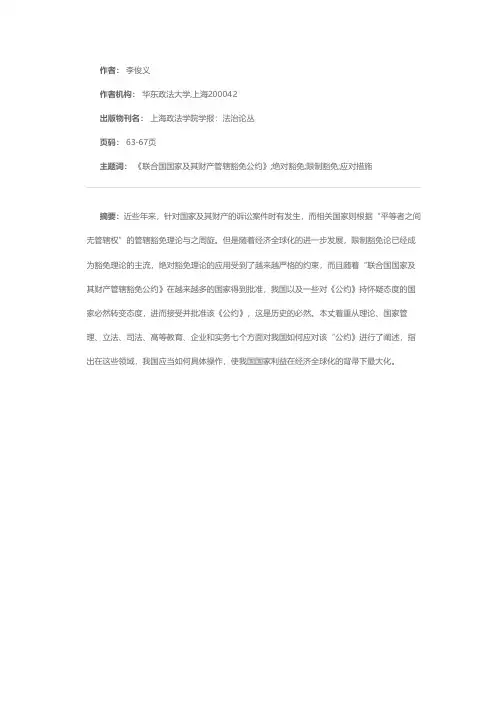
作者: 李俊义
作者机构: 华东政法大学,上海200042
出版物刊名: 上海政法学院学报:法治论丛
页码: 63-67页
主题词: 《联合国国家及其财产管辖豁免公约》;绝对豁免;限制豁免;应对措施
摘要:近些年来,针对国家及其财产的诉讼案件时有发生,而相关国家则根据“平等者之间无管辖权”的管辖豁免理论与之周旋。
但是随着经济全球化的进一步发展,限制豁免论已经成为豁免理论的主流,绝对豁免理论的应用受到了越来越严格的约束,而且随着“联合国国家及其财产管辖豁免公约》在越来越多的国家得到批准,我国以及一些对《公约》持怀疑态度的国家必然转变态度,进而接受并批准该《公约》,这是历史的必然。
本丈着重从理论、国家管理、立法、司法、高等教育、企业和实务七个方面对我国如何应对该“公约》进行了阐述,指出在这些领域,我国应当如何具体操作,使我国国家利益在经济全球化的背帚下最大化。
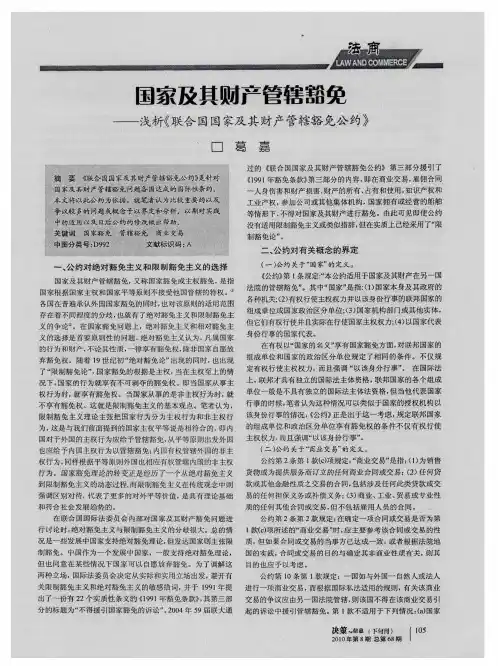
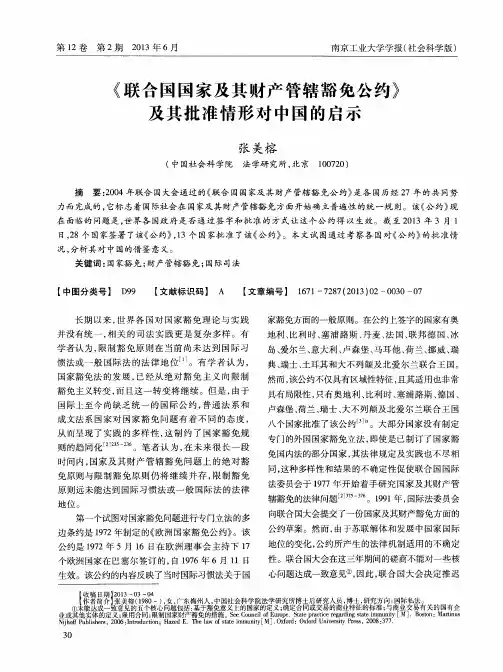
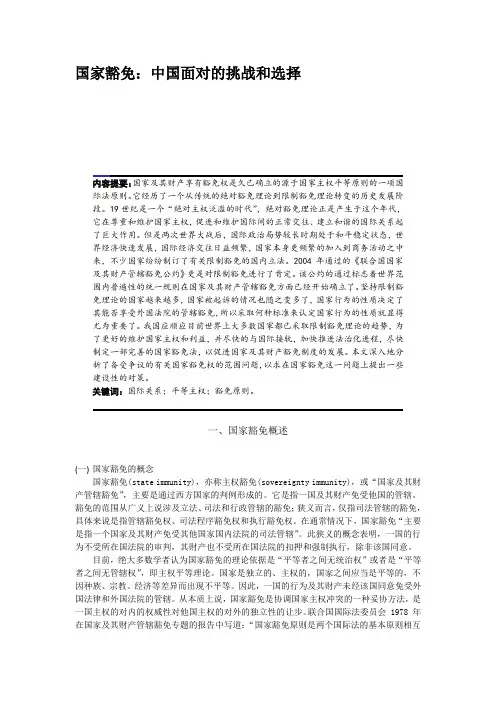
国家豁免:中国面对的挑战和选择内容提要:国家及其财产享有豁免权是久已确立的源于国家主权平等原则的一项国际法原则。
它经历了一个从传统的绝对豁免理论到限制豁免理论转变的历史发展阶段。
19世纪是一个“绝对主权泛滥的时代”,绝对豁免理论正是产生于这个年代,它在尊重和维护国家主权,促进和维护国际间的正常交往、建立和谐的国际关系起了巨大作用。
但是两次世界大战后,国际政治局势较长时期处于和平稳定状态,世界经济快速发展,国际经济交往日益频繁,国家本身更频繁的加入到商务活动之中来,不少国家纷纷制订了有关限制豁免的国内立法。
2004 年通过的《联合国国家及其财产管辖豁免公约》更是对限制豁免进行了肯定。
该公约的通过标志着世界范围内普遍性的统一规则在国家及其财产管辖豁免方面已经开始确立了。
坚持限制豁免理论的国家越来越多,国家被起诉的情况也随之变多了,国家行为的性质决定了其能否享受外国法院的管辖豁免,所以采取何种标准来认定国家行为的性质就显得尤为重要了。
我国应顺应目前世界上大多数国家都已采取限制豁免理论的趋势,为了更好的维护国家主权和利益,并尽快的与国际接轨,加快推进法治化进程,尽快制定一部完善的国家豁免法,以促进国家及其财产豁免制度的发展。
本文深入地分析了备受争议的有关国家豁免权的范围问题,以求在国家豁免这一问题上提出一些建设性的对策。
关键词:国际关系;平等主权;豁免原则。
一、国家豁免概述(一)国家豁免的概念国家豁免(state immunity),亦称主权豁免(sovereignty immunity),或“国家及其财产管辖豁免”,主要是通过西方国家的判例形成的。
它是指一国及其财产免受他国的管辖。
豁免的范围从广义上说涉及立法、司法和行政管辖的豁免;狭义而言,仅指司法管辖的豁免,具体来说是指管辖豁免权、司法程序豁免权和执行豁免权。
在通常情况下,国家豁免“主要是指一个国家及其财产免受其他国家国内法院的司法管辖”。
此狭义的概念表明,一国的行为不受所在国法院的审判,其财产也不受所在国法院的扣押和强制执行,除非该国同意。
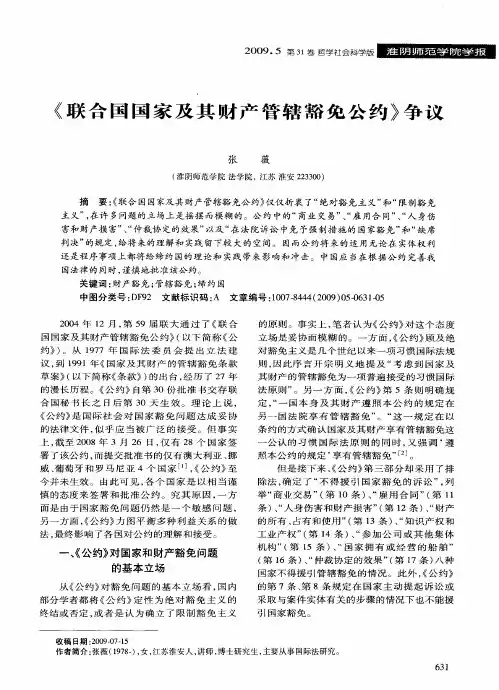
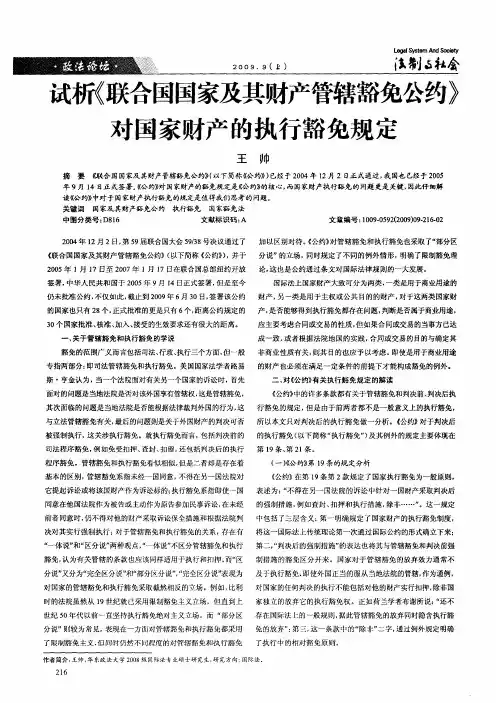
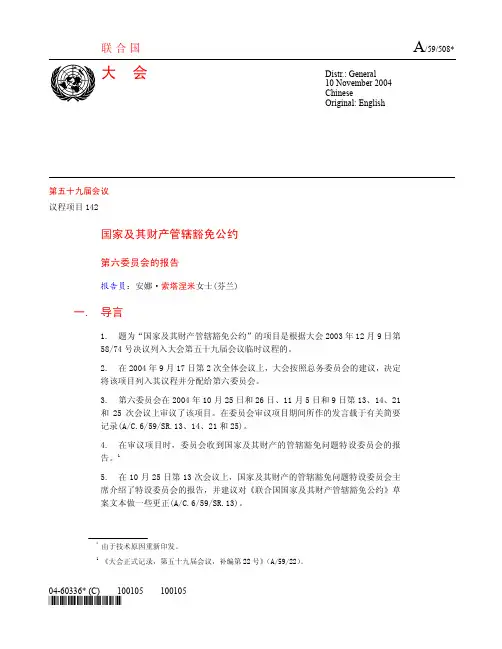
《联合国国家及其财产管辖豁免公约》评介《联合国国家及其财产管辖豁免公约》是第一个全面规范国家及其财产管辖豁免问题的普遍性国际公约,也是第一个确认国家及其财产限制豁免的普遍性国际公约。
该《公约》的通过和开放签署对国际法的发展具有重要的理论和现实意义。
一、《公约》的起草背景和过程国家豁免主要涉及一国法院对他国的国家行为及财产是否有权管辖,以及对外国财产是否有权强制执行问题。
其对象是外国的国家行为及国家财产,其本质涉及如何协调两个国家主权和两种利益的关系这一重大而敏感问题。
如何在主张豁免国的国家人格的域外效力与给予豁免国的司法主权的域内效力之间取得合理平衡,以及如何在保护国家利益与保护个人利益之间保持合理平衡,不仅是一个法律问题,而且是一个政治问题,涉及政治考量、价值判断和政策取舍等许多因素。
纵观1812年美国联邦法院在斯库诺交易号案(Schooner Exchange Case)开始确立国家司法管辖豁免这一原则以来近两个世纪的历史,国家豁免的国际法规则的演变大体经历了两个阶段:在20世纪50年代前的一个半世纪,各国普遍奉行绝对豁免原则,即国家行为及财产在另一国法院享有绝对不受管辖和不得执行的特权。
自20世纪50年代以来的半个世纪,国际实践基本上是绝对豁免与限制豁免两种原则并存,但国际上主张限制豁免原则的呼声渐高。
以英、美为代表的西方国家及部分发展中国家认为,国家和私人当事方在商业活动中的地位应当是平等的,国家在其商业性活动中不应享有特权,一国法院应对他国的商业活动有管辖权。
限制豁免原则把国家行为分为统治权行为(acta jure inperii)或称主权行为、公法行为与管理权行为。
(acta jure gestionis)或称非主权行为、私法行为,主张国家的立法、行政、司法等统治权行为可以享受豁免,而国家从事商业活动等非主权行为不能享受豁免。
美国、英国分别于1976年、1978年制订了有关限制豁免的国内立法,欧盟也在1972年制订了《欧洲国家豁免公约》,限制豁免的立法和司法实践逐渐盛行。
联合国特权和豁免公约全文鉴于联合国宪章第一百零四条规定,本组织于每一会员国之领土内,应享受于执行其职务及达成其宗旨所必需之法律行为能力,又鉴于联合国宪章第一百零五条规定,本组织于每一会员国之领土内,应享受于达成其宗旨所必需之特权及豁免。
联合国会员国之代表及本组织之职员,亦应同样享受于其独立行使关于本组织之职务所必需之特权及豁免,因此大会于1946年2月13日通过一项决议核准下列公约,并建议联合国各会员国加入。
第一条法律人格第一节联合国具有法律人格。
联合国并有行为能力:(甲)订立契约;(乙)取得和处分不动产和动产;(丙)提起诉讼。
第二条财产、款项和资产第二节联合国,其财产和资产,不论其位置何处,亦不论由何人持有,对于各种方式的法律程序应享有豁免,但在特定情况下,经联合国明示抛弃其豁免时,不在此限。
惟缔约各国了解抛弃豁免不适用于任何强制执行措施。
第三节联合国的房舍不可侵犯。
联合国的财产和资产,不论其位于何处,亦不论由何人持有,应豁免搜查、征用、没收、征收和任何其他方式的干扰,不论是由于执行行为、行政行为、司法行为或立法行为。
第四节联合国的档案以及一般而论属于联合国或联合国所持有的一切文件不论其置于何处,均属不可侵犯。
第五节在不受任何财政管制、财政条例和延期偿付令的限制下,(甲)联合国得持有款项、黄金或任何货币,并得以任何货币运用账款;(乙)联合国得自一国至他国或在一国境内自由移转其款项、黄金或货币,并得将其所持有的任何货币换成任何其他货币。
第六节联合国于行使上述第五节的权利时,应适当顾及任何会员国政府所提的主张,但以认为能实行此种主张而不损害联合国的利益为限。
第七节联合国,其资产、收入以及其他财产:(甲)应免除一切直接税;但联合国对于事实上纯为公用事业服务费用的税捐不得要求免除;(乙)对于联合国为公务用途而运入和运出的物品,应免除关税和进出口的禁止或限制;但这项免税进口的物品非依照与进口国政府商定的条件不得在该国出售;(丙)对于联合国的出版物,应免除关税以及进出口的禁止和限制。
·新问题笔谈·政治与法律2007年第1期《联合国国家及其财产管辖豁免公约》规则的性质与适用王虎华罗国强(华东政法学院,上海200042)摘要:《联合国国家及其财产管辖豁免公约》规定了国家主权有限豁免的内容和标准。
《公约》有关有限豁免主义的规则是国际条约法规范,尚不能构成国际习惯法规范。
但《公约》的通过与日后的生效,将促使有限豁免主义发展成为国际习惯法。
《公约》规则在我国不应得到直接适用。
我国应制定关于国家及其财产豁免的法律,一方面将《公约》规则转化为国内法并在缔约国之间适用,另一方面对非缔约国(也包括对《公约》提出保留的缔约国)继续实行对等原则。
在今后的司法实践中,应以《公约》规则来解释国内法,从而使国内法与《公约》保持一致。
关键词:《联合国国家及其财产管辖豁免公约》;管辖豁免;执行豁免;国际公约中图分类号:DF92 文献标识码:A 文章编号:1005-9512(2007)01-0034-05《联合国国家及其财产管辖豁免公约》(以下简称《公约》)已经于2004年12月2日通过。
截止2006年12月5日,《公约》已经得到了25个国家的签署。
1 《公约》有望在2007年1月17日,即《公约》第28条所规定的开放签署截止日期前得到30个以上国家的签署。
我国已经于2005年9月14日签署了《公约》,故而可见,我国将在适当的时候批准《公约》,而生效后的《公约》也将在我国国内适用。
一、《公约》的主要规则及其性质(一)《公约》的主要规则首先,国家行为及财产在他国享有诉讼管辖豁免、诉讼保全豁免和强制执行豁免,2 但国家也可以通过明示同意、主动参与诉讼或反诉的方式放弃这些豁免。
其次,国家在商业交易、雇佣合同、侵权、财产权、知识产权、参加公司或其他集体机构、国家拥有或经营的船舶、仲裁协议的效果等8种例外情况下,不享有诉讼管辖豁免;判断是否属于商业交易,作者简介:王虎华,华东政法学院教授、博士生导师;罗国强,华东政法学院讲师、法学博士。
联合国国家及其财产管辖豁免公约中英对照United Nations Convention on Jurisdictional Immunities of States and Their Property The States Parties to the present Convention,Considering that the jurisdictional immunities of States and theirproperty are generally accepted as a principle of customary international law, Having in mind the principles of international law embodied in theCharter of the United Nations,Believing that an international convention on the jurisdictionalimmunities of States and their property would enhance the rule of law and legal certainty, particularly in dealings of States with natural or juridical persons, and would contribute to the codification and development of international law and the harmonization of practice in this area,Taking into account developments in State practice with regard to the jurisdictional immunities of States and their property,Affirming that the rules of customary international law continue togovern matters not regulated by the provisions of the present Convention, Have agreed as follows:Part IIntroductionArticle 1Scope of the present ConventionThe present Convention applies to the immunity of a State and itsproperty from the jurisdiction of the courts of another State.Article 2Use of terms1. For the purposes of the present Convention:(a) “court” means any organ of a State, however named, entitled to exercise judicial functions;(b) “State” means:(i) the State and its various organs of government;(ii) constituent units of a federal State or political subdivisions of the State, which are entitled to perform acts in the exercise of sovereign authority, and are acting in that capacity;– 2 –(iii) agencies or instrumentalities of the State or other entities, to theextent that they are entitled to perform and are actually performing actsin the exercise of sovereign authority of the State;(iv) representatives of the State acting in that capacity;(c) “commercial transaction” means:(i) any commercial contract or transaction for the sale of goods orsupply of services;(ii) any contract for a loan or other transaction of a financial nature, including any obligation of guarantee or of indemnity in respect of anysuch loan or transaction;(iii) any other contract or transaction of a commercial, industrial,trading or professional nature, but not including a contract ofemployment of persons.2. In determining whether a contract or transaction is a “commercial transaction” under paragraph 1 (c), reference should be made primarily to the nature of the contract or transaction, but its purpose should also be taken into account if the parties to the contract or transaction have so agreed, or if, in the practice of the State of the forum, that purpose is relevant to determining the non-commercial character of the contract or transaction.3. The provisions of paragraphs 1 and 2 regarding the use of terms in the present Convention are without prejudice to the use of those terms or to the meanings which may be given to them in other international instruments or in the internal law of any State.Article 3Privileges and immunities not affected by the present Convention1. The present Convention is without prejudice to the privileges and immunities enjoyed by a State under international law in relation to the exercise of the functions of:(a) its diplomatic missions, consular posts, special missions, missionsto international organizations or delegations to organs of international organizations or to international conferences; and(b) persons connected with them.2. The present Convention is without prejudice to privileges andimmunities accorded under international law to heads of State ratione personae.3. The present Convention is without prejudice to the immunities enjoyedby a State under international law with respect to aircraft or space objects owned or operated by a State.– 3 –Article 4Non-retroactivity of the present ConventionWithout prejudice to the application of any rules set forth in the present Convention to which jurisdictional immunities of States and their property are subject under international law independently of the present Convention, the present Convention shall not apply to any question of jurisdictional immunities of States or their property arising in a proceeding instituted against a State before a court of another State prior to the entry into force of the present Convention for the States concerned.Part IIGeneral principlesArticle 5State immunityA State enjoys immunity, in respect of itself and its property, from the jurisdiction of the courts of another State subject to the provisions of the present Convention. Article 6Modalities for giving effect to State immunity1. A State shall give effect to State immunity under article 5 by refraining from exercising jurisdiction in a proceeding before its courts against another State and to that end shall ensure that its courts determine on their own initiative that the immunity of that other State under article 5 is respected.2. A proceeding before a court of a State shall be considered to have been instituted against another State if that other State:(a) is named as a party to that proceeding; or(b) is not named as a party to the proceeding but the proceeding ineffect seeks to affect the property, rights, interests or activities of that other State. Article 7Express consent to exercise of jurisdiction1. A State cannot invoke immunity from jurisdiction in a proceeding beforea court of another State with regard to a matter or case if it has expressly consentedto the exercise of jurisdiction by the court with regard to the matter or case:(a) by international agreement;(b) in a written contract; or– 4 –(c) by a declaration before the court or by a written communicationin a specific proceeding.2. Agreement by a State for the application of the law of another Stateshall not be interpreted as consent to the exercise of jurisdiction by the courts of that other State.Article 8Effect of participation in a proceeding before a court1. A State cannot invoke immunity from jurisdiction in a proceeding beforea court of another State if it has:(a) itself instituted the proceeding; or(b) intervened in the proceeding or taken any other step relating tothe merits. However, if the State satisfies the court that it could not have acquired knowledge of facts on which a claim to immunity can be based until after it took such a step, it can claim immunity based on those facts, provided it does so at the earliest possible moment.2. A State shall not be considered to have consented to the exercise ofjurisdiction by a court of another State if it intervenes in a proceeding or takes any other step for the sole purpose of:(a) invoking immunity; or(b) asserting a right or interest in property at issue in the proceeding.3. The appearance of a representative of a State before a court of another State as a witness shall not be interpreted as consent by the former State to the exercise of jurisdiction by the court.4. Failure on the part of a State to enter an appearance in a proceedingbefore a court of another State shall not be interpreted as consent by the former State to the exercise of jurisdiction by the court.Article 9Counterclaims1. A State instituting a proceeding before a court of another State cannot invoke immunity from the jurisdiction of the court in respect of any counterclaim arising outof the same legal relationship or facts as the principal claim.2. A State intervening to present a claim in a proceeding before a court of another State cannot invoke immunity from the jurisdiction of the court in respect of any counterclaim arising out of the same legal relationship or facts as the claim presented by the State.– 5 –3. A State making a counterclaim in a proceeding instituted against itbefore a court of another State cannot invoke immunity from the jurisdiction of the court in respect of the principal claim.Part IIIProceedings in which State immunity cannot be invokedArticle 10Commercial transactions1. If a State engages in a commercial transaction with a foreign natural or juridical person and, by virtue of the applicable rules of private international law, differences relating to the commercial transaction fall within the jurisdiction of a court of another State, the State cannot invoke immunity from that jurisdiction in a proceeding arising out of that commercial transaction.2. Paragraph 1 does not apply:(a) in the case of a commercial transaction between States; or(b) if the parties to the commercial transaction have expressly agreed otherwise.3. Where a State enterprise or other entity established by a State which hasan independent legal personality and is capable of:(a) suing or being sued; and(b) acquiring, owning or possessing and disposing of property,including property which that State has authorized it to operate or manage,is involved in a proceeding which relates to a commercial transaction in which that entity is engaged, the immunity from jurisdiction enjoyed by that State shall not be affected.Article 11Contracts of employment1. Unless otherwise agreed between the States concerned, a State cannot invoke immunity from jurisdiction before a court of another State which is otherwise competent in a proceeding which relates to a contract of employment between theState and an individual for work performed or to be performed, in whole or in part, in the territory of that other State.2. Paragraph 1 does not apply if:(a) the employee has been recruited to perform particular functions inthe exercise of governmental authority;(b) the employee is:– 6 –(i) a diplomatic agent, as defined in the Vienna Convention onDiplomatic Relations of 1961;(ii) a consular officer, as defined in the Vienna Convention onConsular Relations of 1963;(iii) a member of the diplomatic staff of a permanent mission to an international organization or of a special mission, or is recruited to represent a State at an international conference; or(iv) any other person enjoying diplomatic immunity;(c) the subject-matter of the proceeding is the recruitment, renewal of employment or reinstatement of an individual;(d) the subject-matter of the proceeding is the dismissal ortermination of employment of an individual and, as determined by the head of State, the head of Government or the Minister for Foreign Affairs of the employer State, such a proceeding would interfere with the security interests of that State;(e) the employee is a national of the employer State at the time whenthe proceeding is instituted, unless this person has the permanent residence in the State of the forum; or(f) the employer State and the employee have otherwise agreed inwriting, subject to any considerations of public policy conferring on the courts of the State of the forum exclusive jurisdiction by reason of the subject-matter of the proceeding.Article 12Personal injuries and damage to propertyUnless otherwise agreed between the States concerned, a State cannotinvoke immunity from jurisdiction before a court of another State which is otherwise competent in a proceeding which relates to pecuniary compensation for death or injury to the person, or damage to or loss of tangible property, caused by an act oromission which is alleged to be attributable to the State, if。
联合国国家及其财产管辖豁免公约文章属性•【缔约国】联合国•【条约领域】外交•【公布日期】2005.01.17•【条约类别】公约•【签订地点】纽约正文联合国国家及其财产管辖豁免公约*本公约缔约国,考虑到国家及其财产的管辖豁免为一项普遍接受的习惯国际法原则,铭记《联合国宪章》所体现的国际法原则,相信一项关于国家及其财产的管辖豁免国际公约将加强法治和法律的确定性,特别是在国家与自然人或法人的交易方面,并将有助于国际法的编纂与发展及此领域实践的协调,考虑到国家及其财产的管辖豁免方面国家实践的发展,申明习惯国际法的规则仍然适用于本公约没有规定的事项,议定如下:第一部分导言第1条本公约的范围本公约适用于国家及其财产在另一国法院的管辖豁免。
第2条用语1.为本公约的目的:(a)“法院”是指一国有权行使司法职能的不论名称为何的任何机关;(b)“国家”是指:(一)国家及其政府的各种机关;(二)有权行使主权权力并以该身份行事的联邦国家的组成单位或国家政治区分单位;(三)国家机构、部门或其他实体,但须它们有权行使并且实际在行使国家的主权权力;(四)以国家代表身份行事的国家代表。
(C)“商业交易”是指:(一)为销售货物或为提供服务而订立的任何商业合同或交易;(二)任何贷款或其他金融性质之交易的合同,包括涉及任何此类贷款或交易的任何担保义务或补偿义务;(三)商业、工业、贸易或专业性质的任何其他合同或交易,但不包括雇用人员的合同。
2.在确定一项合同或交易是否为第1款(c)项所述的“商业交易”时,应主要参考该合同或交易的性质,但如果合同或交易的当事方已达成一致,或者根据法院地国的实践,合同或交易的目的与确定其非商业性质有关,则其目的也应予以考虑。
3.关于本公约用语的第1款和第2款的规定不妨碍其他国际文书或任何国家的国内法对这些用语的使用或给予的含义。
第3条不受本公约影响的特权和豁免1.本公约不妨碍国家根据国际法所享有的有关行使下列职能的特权和豁免:(a)其外交代表机构、领事机构、特别使团、驻国际组织代表团,或派往国际组织的机关或国际会议的代表团的职能;和(b)与上述机构有关联的人员的职能。
作者: 夏林华
作者机构: 武汉大学法学院国际法博士生,湖北武汉 430072
出版物刊名: 求索
页码: 100-102页
主题词: 国家豁免;限制豁免理论;国家豁免的例外;国际法
摘要:《联合国国家及其财产管辖豁免公约》标志着国家豁免原则演变的一个新里程碑。
公约坚持了限制豁免理论,即国家与外国自然人或法人从事商业交易时,适用与私营实体一样的司法管辖规则。
从国际法的角度来看,公约所包含的法律规则,特别是公约中的关键性条款如公约的适用范围、国家豁免例外、免于强制措施的国家豁免等,以及公约制定过程中所体现的国际立法趋势,将对国际法以及国际法律秩序产生重要的影响。
为了适应进一步对外开放的需要,我国应尽快着手国家豁免方面的立法工作。